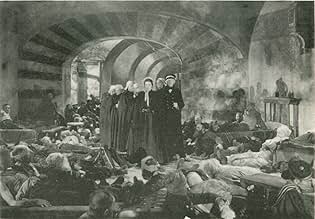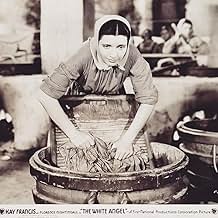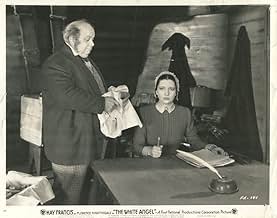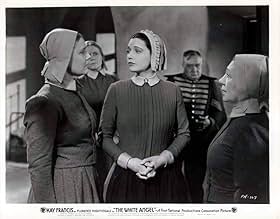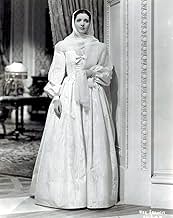Agrega una trama en tu idiomaA look at the life of Florence Nightingale.A look at the life of Florence Nightingale.A look at the life of Florence Nightingale.
- Dirección
- Guionistas
- Elenco
- Premios
- 2 premios ganados y 1 nominación en total
Lillian Kemble-Cooper
- Parthenope 'Parthe' Nightingale
- (as Lillian Cooper)
Opiniones destacadas
Kay Francis stars in this biopic of Florence Nightingale. I love old Hollywood biopics. They get a lot of flack today by certain types for embellishing some facts of these people's lives. Seems to me biopics today have even worse flaws. Instead of embellishing positively they embellish negatively. In other words, instead of focusing on inspiring uplifting strengths and virtues they focus on the faults and vices of historical figures. To each their own but personally I will take the rousing biographical films from back then over the salacious and often slanderous ones of the modern era.
Rant aside, this is not the strongest biopic but it is a decent one. Kay Francis works against type quite well. She's helped by an amazing supporting cast. To name a few: Donald Crisp, Nigel Bruce, Donald Woods, Henry O'Neill, Ian Hunter, Halliwell Hobbes -- they all give first rate support.
Overall it's an entertaining film. I recommend it to people who are interested In the story of Florence Nightingale and anybody who enjoys Golden Age of Hollywood biographical dramas.
Rant aside, this is not the strongest biopic but it is a decent one. Kay Francis works against type quite well. She's helped by an amazing supporting cast. To name a few: Donald Crisp, Nigel Bruce, Donald Woods, Henry O'Neill, Ian Hunter, Halliwell Hobbes -- they all give first rate support.
Overall it's an entertaining film. I recommend it to people who are interested In the story of Florence Nightingale and anybody who enjoys Golden Age of Hollywood biographical dramas.
The sharp, focused performance by Kay Francis carries this film into an impressive arena for its viewer. I've seen in several times and although Francis doesn't go into histrionics in her portrayal like some of the "greats" would -- Francis exemplifies the determination, courage, and humaness of one who "feels a calling". She never wavers in what she is about, frustrated but not discouraged, and Francis' subtlety emphasises these qualities. The beginning of the film offers Francis a chance to don the elegant gowns of the mid 1800's, but most of the film she's wearing a plain nurse's uniform and often looking quite drawn from the conflicts with male prejudice on the Crimean front and the squalid conditions that she faced in all directions. I don't know how historically accurate the film is, but it gets to the heart of the Nightingale story and what she was up against. Strong support from players like Donald Crisp and Ian Hunter add to the overall success.
William Dieterle, like so many of his contemporaries, left Germany in the 1930's and headed for Tinseltown. He proved himself very adaptable and whilst under contract to Warner Brothers, raised that studio's prestige by directing a series of well-mounted biopics. Invariably set in foreign climes these studio-bound films were all totally convincing in terms of period and place.
This biopic of Florence Nightingale is no exception and although considered the weakest of them all, not least by Dieterle himself, it remains a convincing portrait of Victorian England with its squalor and class-ridden complacency regarding the plight of the lower orders and the general view that nursing was little better than prostitution. It is no less effective when switching to the Crimea and the horrendous conditions that prevailed in the soldiers' hospital at Scutari.
Historically of course it is Hollywood Hokum and full of inaccuracies but it succeeds in its purpose of depicting a truly extraordinary woman and her battle with institutionalised ignorance and prejudice.
Dieterle's customary visual sense is complemented by two stalwarts of Warner Bros, cinematographer Tony Gaudio and the brilliant head of Art Direction, Polish émigré, Anton Grot.
It is generally agreed that the weak link lies in the casting of Kay Francis as Florence. She was at the time Queen of the Lot at Warner Bros and its highest paid star. This, coupled with her innate classiness would make her the obvious choice. She is certainly not lacking in sincerity and it is not her fault that her part has been written more as a symbol than as flesh and blood which alas makes the character rather one-dimensional. Ian Hunter does his best with another one-dimensional role as a reporter for 'The Times' and Donald Crisp excels as the odious Dr. Hunt.
Whatever its shortcomings this version is infinitely more powerful and engaging than that of Herbert Wilcox in 1950 which is little more than a series of tableaux-vivants.
Suffice to say that since her death Miss Nightingale's achievements and far-reaching influence have been overshadowed by suggestions of misogyny, lesbianism and racism! She remains however a Feminist icon despite her observation that although they might crave sympathy "women have no sympathy and my experience of women is almost as large as Europe."
This biopic of Florence Nightingale is no exception and although considered the weakest of them all, not least by Dieterle himself, it remains a convincing portrait of Victorian England with its squalor and class-ridden complacency regarding the plight of the lower orders and the general view that nursing was little better than prostitution. It is no less effective when switching to the Crimea and the horrendous conditions that prevailed in the soldiers' hospital at Scutari.
Historically of course it is Hollywood Hokum and full of inaccuracies but it succeeds in its purpose of depicting a truly extraordinary woman and her battle with institutionalised ignorance and prejudice.
Dieterle's customary visual sense is complemented by two stalwarts of Warner Bros, cinematographer Tony Gaudio and the brilliant head of Art Direction, Polish émigré, Anton Grot.
It is generally agreed that the weak link lies in the casting of Kay Francis as Florence. She was at the time Queen of the Lot at Warner Bros and its highest paid star. This, coupled with her innate classiness would make her the obvious choice. She is certainly not lacking in sincerity and it is not her fault that her part has been written more as a symbol than as flesh and blood which alas makes the character rather one-dimensional. Ian Hunter does his best with another one-dimensional role as a reporter for 'The Times' and Donald Crisp excels as the odious Dr. Hunt.
Whatever its shortcomings this version is infinitely more powerful and engaging than that of Herbert Wilcox in 1950 which is little more than a series of tableaux-vivants.
Suffice to say that since her death Miss Nightingale's achievements and far-reaching influence have been overshadowed by suggestions of misogyny, lesbianism and racism! She remains however a Feminist icon despite her observation that although they might crave sympathy "women have no sympathy and my experience of women is almost as large as Europe."
The White Angel which was a film about the crucial years in the life of Florence
Nightingale when she during the Crimean War popularized the career of nursing
for women and sanitary hospitals. Her work in Great Britain and Clara Barton in
the USA during the Civil War set the standards for the nursing profession as we
know it now.
Nightingale came from an upper class background and that probably stood her in good stead because someone who had to worry about how the next month's rent was to be paid or the next meal coming from could not have taken on what she did or faced down the sexist attitudes of her age.
The British cinema did the best version of her life in 1951 with Anna Neagle playing Nightingale. Besides Florence herself the real name of only one other character is used, that of Lord Raglan the Commander of the British forces in the Crimea played here by Halliwell Hobbes. The real players are used in the Neagle film.
This was a change of pace for Kay Francis who usually was more glamorous in her roles than here. Francis reminds me a lot of Rosaland Russell when she did Sister Kenny.
This was part of Warner Brothers biographical films of the late 30s and The White Angel was the only one to have a female subject. The White Angel bogs down a bit in spots and for a more accurate film the Neagle picture is better. Still this is reasonably entertaining and Kay Francis fans will like it.
Nightingale came from an upper class background and that probably stood her in good stead because someone who had to worry about how the next month's rent was to be paid or the next meal coming from could not have taken on what she did or faced down the sexist attitudes of her age.
The British cinema did the best version of her life in 1951 with Anna Neagle playing Nightingale. Besides Florence herself the real name of only one other character is used, that of Lord Raglan the Commander of the British forces in the Crimea played here by Halliwell Hobbes. The real players are used in the Neagle film.
This was a change of pace for Kay Francis who usually was more glamorous in her roles than here. Francis reminds me a lot of Rosaland Russell when she did Sister Kenny.
This was part of Warner Brothers biographical films of the late 30s and The White Angel was the only one to have a female subject. The White Angel bogs down a bit in spots and for a more accurate film the Neagle picture is better. Still this is reasonably entertaining and Kay Francis fans will like it.
... in that the only reason I can figure this film is legendary as a bomb is that Kay Francis was not accepted in her role just as Clark Gable was not accepted at the time in Parnell.
Francis was normally the leading lady in sparkling romantic comedies, her most prolific years being the precode ones. She also played the tragic figure in romantic dramas where she might sacrifice to protect a child, or she was misunderstood and believed to be unfaithful and ostracized, or was partnered up with an abusive man. But playing 19th century pioneering nurse Florence Nightingale? This was a complete departure and would be as odd as seeing Errol Flynn play Abraham Lincoln.
Plus Kay doesn't project much genuine emotion during the film. Somebody Florence might have married had she taken the conventional path dies right before her eyes and ... nothing? No tears? Since director Dieterle also directed Paul Muni in The Story of Louis Pasteur the year before, there is no explanation for what happened here.
This film actually didn't bomb, but it was the beginning of the end of Kay at Warner Brothers as her relationship with Jack Warner quickly deteriorated and he realized that Bette Davis was the studio's female star of the present and future.
One thing the film did particularly poorly - All of those intertitles! Some of them are so busy it is like reading a book. Eight years past the transition to sound and this device had been largely abandoned as directors learned to change scenes without it.
This one is worth your time if you forget your preconceived notions about its classification as a bomb and just give it a fair chance.
Francis was normally the leading lady in sparkling romantic comedies, her most prolific years being the precode ones. She also played the tragic figure in romantic dramas where she might sacrifice to protect a child, or she was misunderstood and believed to be unfaithful and ostracized, or was partnered up with an abusive man. But playing 19th century pioneering nurse Florence Nightingale? This was a complete departure and would be as odd as seeing Errol Flynn play Abraham Lincoln.
Plus Kay doesn't project much genuine emotion during the film. Somebody Florence might have married had she taken the conventional path dies right before her eyes and ... nothing? No tears? Since director Dieterle also directed Paul Muni in The Story of Louis Pasteur the year before, there is no explanation for what happened here.
This film actually didn't bomb, but it was the beginning of the end of Kay at Warner Brothers as her relationship with Jack Warner quickly deteriorated and he realized that Bette Davis was the studio's female star of the present and future.
One thing the film did particularly poorly - All of those intertitles! Some of them are so busy it is like reading a book. Eight years past the transition to sound and this device had been largely abandoned as directors learned to change scenes without it.
This one is worth your time if you forget your preconceived notions about its classification as a bomb and just give it a fair chance.
¿Sabías que…?
- TriviaMuch disagreement to the origin of the source material exists. Some contemporary sources believed the source was Lytton Strachey's 1918 biographical essay in "Eminent Victorians". Others contend Michael Jacoby was the author. Warner Bros. executive Hal B. Wallis contended that the life of Florence Nightingale was in the public domain, and that screenwriter Mordaunt Shairp did his own research. The MPAA agreed with Wallis; no source credit was necessary.
- ErroresWhen Florence is receiving the news on the steps of the hospital of the sinking of the French transport, the shadow of the boom microphone moves onto then quickly off her left sleeve.
- Créditos curiososPrologue: Towards the year 1850, England was at peace with the world. Her men were following her ships to the four corners of the earth, building the great empire that is Queen Victoria's monument. Women were only permitted to nod meek approval. In all England, only Her Majesty had the right to express herself with the independence of a man.
- ConexionesFeatured in Breakdowns of 1936 (1936)
- Bandas sonorasAuld Lang Syne
(uncredited)
Traditional
Lyrics by Robert Burns
Incorporated into the score at the new year
Sung by the crowd celebrating the new year
Selecciones populares
Inicia sesión para calificar y agrega a la lista de videos para obtener recomendaciones personalizadas
Detalles
- Tiempo de ejecución
- 1h 32min(92 min)
- Color
- Mezcla de sonido
- Relación de aspecto
- 1.37 : 1
Contribuir a esta página
Sugiere una edición o agrega el contenido que falta



